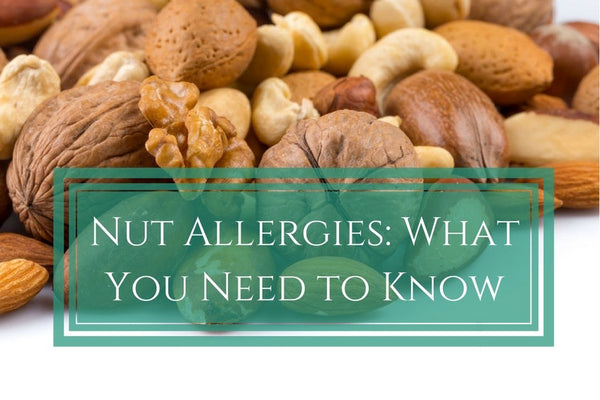Nut Allergies: What You Need to Know
Nut allergies are among the most common in modern society, particularly in school - age children, which is why many schools now send home a notice at the beginning of the year reminding parents to only put nut - free snacks together for their child.
Despite the rise of nut allergies , there are a number of things people don't know about them, even if they themselves suffer from one . To help with this, we have compiled a list of some of the most important things you need to know about nut allergies , both if you suffer from one or know someone who might. Dealing with a nut allergy can seem stressful and overwhelming at first, but as long as you are aware you can prevent serious reactions.

More than Peanuts
If someone has a nut allergy, most people automatically assume it is an allergy to peanuts and nothing else. It is important to note that this is not the case. While an allergy to peanuts is common, people can also be allergic to more than one nut. Some nuts people are often allergic to include walnuts, pistachios, pine nuts, macadamia nuts, hickory nuts, Brazil nuts, almonds, cashews, and chestnuts. Do not automatically assume the other nuts are safe — they may not be. If you suffer from a peanut allergy, it is important to consult with your doctor to see if you are allergic to any other nuts.
Check All Food
While peanuts and other nuts are easy to spot in some items — someone with an allergy should not be around peanut butter, almond butter, et cetera — there are a shocking number of items that may contain nuts. This is why it is important for parents to check the snacks they want to buy for their children and avoid ones with the warning “may contain nuts’ or “traces of nuts,” as these may have enough cross - contamination to be harmful. If you suffer from the nut allergy, you can also check your own food.
Popular foods you will want to check include the following: baked goods, candy, trail mix, soup, international food, sauces, cereal, and even honey. If your allergy (or your child’s) is severe, it is important to check everything. You may even want to check if you have to send your child to school with nut - free snacks.
Spotting a Reaction
Even doing everything to avoid an allergic reaction cannot guarantee you will never experience one. While you can avoid putting snacks with nuts in your child’s lunch, you cannot guarantee that every parent at the school will be as diligent.
This is why spotting the symptoms of a reaction is an important skill. Common symptoms include a congested or runny nose, itchy skin or hives (small or large red welts, like a rash), nausea, as well as an itching or tingling sensation around the mouth and throat. The most severe reaction to a peanut allergy is anaphylaxis, which makes it difficult to breathe, can send your body into shock, and may even be life threatening. If you have to inject yourself wit h epinephrine (common with severe nut allergies) note that you will still need to visit the hospital, as the reaction is likely to return. This also applies if you have to administer the medication to someone else suffering from a reaction.
Educate Others
If your child has a nut allergy, be sure to talk to the school administration, their teacher, the school nurse, et cetera, about it . You must make sure they have your child’s medication if he or she is too young to administer it themselves. They will need to know what to watch out for i n the event of a reaction, while also requiring emergency contact information and specific details about what nuts your child is allergic to. If you are the one who suffers from the allergy, talk to your family and friends and let them know what they should do if you have a reaction, inform people prior to a potluck dinner, and create a plan with your doctor. The most dangerous thing about nut allergies is a lack of knowledge: it is imperative to know how to avoid reactions and manage them if they do occur. This applies to both the allergy - suffer er and the people in their life
Image: rtsubin / 123RF Stock Photo
- Tags: Allergies

